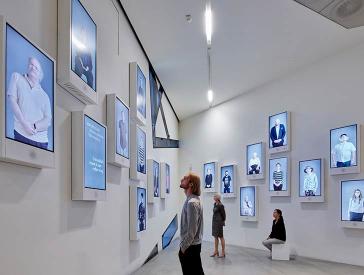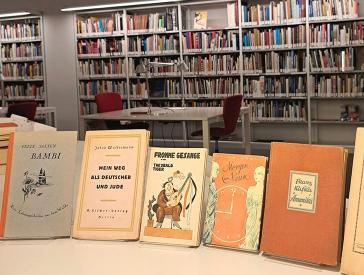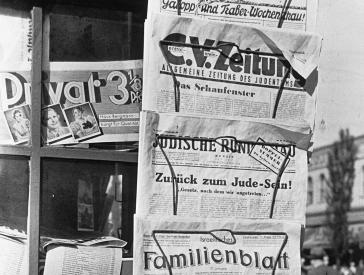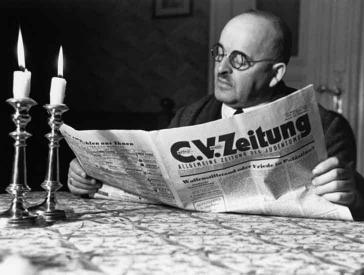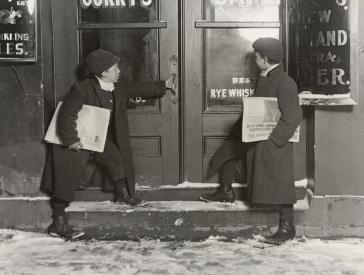Cultural Program in March 2014
Press Invitation
Press Release, Thu 27 Feb 2014
Focus on "Theresienstadt Ghetto": Program Accompanying the Premiere of the "Defiant Requiem"
27 February to 4 May
Special Exhibition
Bedřich Fritta
The exhibition presents a selection of works by the graphic artist Bedřich Fritta that originated between 1942 and 1944 in the Theresienstadt ghetto.
Location: Libeskind Building, ground level, Eric F. Ross Gallery
Admission: with the museum ticket
27 February to 23 March
Presentation: No Butterflies Fly Here
Children and Youths at the Theresienstadt Ghetto
The library and archives of the Jewish Museum Berlin present their collections of books, diaries, letters, and drawings by children and young people who lived in the Theresienstadt Ghetto.
Location: Academy
Admission: free
1 March
Film
Transport from Paradise (Transport aus dem Paradies / Transport z ráje)
with an introduction by Hanno Loewy, film scholar and director of the Jewish Museum Hohenems
Directed by Zbyněk Brynych, CSSR 1963, 98 min.
Zbyněk Brynych, known later in West Germany as the style-defining director of "Derrick" and "Der Alte", addresses in his feature film shot in CSSR the forced "involvement" by the Nazis of victims in the process of their own destruction. The sometimes surreal, sometimes bitingly satirical film about the Theresienstadt Ghetto and its Jewish elder "Marmulstaub" is based on Arnost Lustig’s autobiographical book "Nacht und Hoffnung" (Night and hope). "Transport aus dem Paradies" (Transport from paradise) was one of the first films of the 1960s to explore without moral ambiguity the shadiness of the relationship between victim and perpetrator under the despotic rule of absolute domination and destruction. An historical documentary feature film that merits rediscovery.
Location: Academy, Hall
Time: 7.30 pm
Admission: free
2 March
Symposion
Art and Culture in the Theresienstadt Ghetto
The symposion explores in four lectures the history of the "exception ghetto" Theresienstadt from four different angles. Wolfgang Benz, Berlin, speaks about the Theresienstadt Ghetto as a place of deception and destruction; Inka Bertz, Berlin, considers the visual artists imprisoned there; Anna Hájková, Coventry, analyzes the ghetto as a place of unequals , and Hanno Loewy , Hohenems, examines the cinematic and photographic propaganda in the Theresienstadt, Warsaw, and Lodz ghettos.
11 am: Theresienstadt - A Story of Deception and Destruction (Wolfgang Benz, Berlin)
12 pm: Jeunesse Dorée of the Holocaust - The Ghetto as a Society of Unequals (Anna Hájková, Coventry)
2 pm: Drawing in the Ghetto Theresienstadt (Inka Bertz, Berlin)
3 pm: Ghetto and Propaganda or: How Differently Can You Portray Hell? A Reflection on Theresienstadt, Warsaw, and Lodz in Nazi Media (Hanno Loewy , Hohenems)
Location: Old Building, second level, Great Hall
Time: 11 am to 5 pm
Admission: free
3 March
Documentary Film
"Defiant Requiem"
Director: Doug Shultz, USA / UK / Czech Republic 2012, 85 min, English, original version
The documentary film "Defiant Requiem" tells the story of Czech conductor and pianist Rafael Schächter and his production of Verdi’s Messa da Requiem in Theresienstadt, more than 70 years ago. Director Doug Shultz combines the recollections of surviving members of Schächter’s choir with archival material, and documents the rehearsals of Murry Sidlin’s production "Defiant Requiem" in Theresienstadt today.
Location: Academy, Hall
Time: 7.30 pm
Admission: free
4 March
Concert Drama
"Defiant Requiem"
Verdi’s Messa da Requiem at the Theresienstadt Ghetto
The concert drama "Defiant Requiem" is dedicated to the Czech conductor and pianist Rafael Schächter, who performed Verdi's Messa da Requiem with hundreds of prisoners in the Theresienstadt ghetto around 70 years ago.
For the people in the Theresienstadt ghetto, music was an element of self-assertion in a daily camp life shaped by humiliation, misery, illness, and death. Initially performed in secret, the concerts were later abused by the Nazis for propaganda purposes. Rafael Schächter and almost all members of the choir were murdered by the Nazis.
The American conductor Murry Sidlin remembers with the "Defiant Requiem" the people in Theresienstadt for whom the Requiem and work with Rafael Schächter became a means of internal resistance. In his production, he links Verdi’s Requiem with film footage and eyewitness accounts from members of the choir. Seventy years after the last concert in Theresienstadt, we would like to remember the people who contributed under the most extreme conditions to a diverse cultural life in the Theresienstadt ghetto.
Artists
Murry Sidlin (conductor), the Berlin Konzerthaus Orchestra, the Young Ensemble Berlin Choir and the Vocal Academy Berlin (director: Frank Markowitsch), Aga Mikolaj (soprano), Gerhild Romberger (mezzo soprano), Steven Tharp (tenor) István Kovács (bass), Iris Berben and Ulrich Matthes (speakers)
Sponsored by the German Capital Culture Fund (Hauptstadtkulturfond) and the "Remembrance, Responsibility, and Future" Foundation
Location: Konzerthaus Berlin, Gendarmenmarkt
Time: 8 pm
Tickets: 15 to 42 € (plus booking fee) (sold out)
"Defiant Requiem" is presented by arrangement with The Defiant Requiem Foundation.
Under the patronage of
Prof. Monika Grütters MdB, Federal Government Commissioner for Culture and the Media
and Minister of State to the Federal Chancellor; H.E. Dr. Rudolf Jindrák, Ambassador of the Czech Republic to the Federal Republic of Germany; Klaus Wowereit, Governing Mayor of Berlin; Dr. Martin Salm, Chairman of the Board of Directors of the Foundation "Remembrance, Responsibility and Future" (EVZ); Dr. Dieter Graumann, President of the Central Council of Jews in Germany; Dr. h.c. Nikolaus Schneider, Chaiman of the Council of the Evangelical Church in Germany (EKD); Archbishop Dr. Robert Zollitsch, President of the German Bishops’ Conference
Supported by
Hauptstadtkulturfonds; Foundation "Remembrance, Responsibility and Future"(EVZ); Gesellschaft der Freunde und Förderer der Stiftung Jüdisches Museum Berlin e.V.; Friends of the Jewish Museum Berlin in the U.S.
Exclusive- Partner
Volkswagen AG
Media Partners
rbb Kulturradio, rbb Fernsehen, tip Berlin, Jüdische Allgemeine
- Kontakt
-
Press office
T +49 (0)30 259 93 419
presse@jmberlin.de - Address
Jewish Museum Berlin Foundation
Lindenstraße 9–14
10969 Berlin
Special Exhibition and Accompanying Program
Extended until 4 May
In an Instant. Photographs by Fred Stein
Born as son of a rabbi in Dresden in 1909, Fred Stein qualified as a lawyer there and then emigrated to Paris in 1933 and to New York in 1941. In search of a new professional perspective, he opted under the difficult conditions of exile for photography, which had been his hobby until then.
Besides numerous street views of Paris and New York, Fred Stein made over 1,200 portraits, among them well-known personalities such as Hannah Arendt, Albert Einstein, Thomas Mann, Salvador Dalí, Marlene Dietrich, and Willy Brandt.
He did not – like many other photographers – photograph in the studio with a big camera, but strolled through the streets with his miniature camera capturing the city and its people in brief but decisive instants. His special perspective combines his interest in everyday life with his sense for the extraordinary moment and has his particular and charismatic humor shining through time and again.
The exhibition’s more than 130 b/w photographs show a comprehensive retrospective of Fred Stein for the first time in Germany, thus making this complex work accessible to a wider public.
Location: Libeskind Building, ground level, Eric F. Ross Gallery
Admission: with the museum ticket
13 March
Curators Tour
The Making of "In an Instant. Photographs by Fred Stein"
The tour provides insights and background information to the origins of and preparations for the exhibition.
Time: 6 pm
Admission: with the museum ticket
Academy Programs "Migration and Diversity"
20 March
"InderKinder" – On Growing up and Living in Germany
Urmila Goel und Nisa Punnamparambil-Wolf (Eds.)
Reading and Discussion as Part of the Series "New German Stories"
Since the discussion on "Computer-Inder" and the campaign "Kinder statt Inder" in the year 2000, migration from India to Germany has gained public focus.
In the book "InderKinder," children of Indian immigrants – who themselves are no longer children but many of whom have children of their own – write about growing up and living as an "InderKind" in Germany. Their autobiographical stories and scientific essays provide diverse insights into stories of migration that nearly nobody has heard about, into processes of being "made different" and the sometimes more and sometimes less self-conscious use of attributions.
Chaired by Yasemin Shooman, director, academy programs
Location: Academy, Hall
Time: 7.30 pm
Admission: 5 €, reduced rate 3 euros
Visitor Bookings on tel. +49 (0)30 25993 488 or reservierung@jmberlin.de
Readings
17 March
Book Presentation with the Author
Volker Weidermann: Ostende. 1936, Summer of Friendship ("Ostende. 1936, Sommer der Freundschaft")
A Belgian seaside resort with history and luster - this is where all those who no longer have a home in Nazi Germany come together again. Stefan Zweig, Joseph Roth, Irmgard Keun, Kisch and Toller, Koestler and Kesten, the banned poets. Sun, sea, drinks - it could be a vacation with friends … if the political situation was not worsening daily, if they were not all persecuted. They are poets on the run, writers in exile.
Volker Weidermann, literary editor of the "Frankfurter Allgemeinen Sonntagszeitung" knowledgeably and engagingly tells of this summer just before the Second World War when Zweig, Roth, and Keun celebrate life once again as only the desperate can.
A cooperation with the Literaturhandlung.
Location: Old Building, second level, Great Hall
Time: 7.30 pm
Admission: 8 €, reduced rate 6 euros
Visitor Bookings on tel. +49 (0)30 88 24 250 (Literaturhandlung)
19 March
Reading and Talk with the Author Eliyah Havemann
How do I become a Jew? And if yes, why? ("Wie wird man Jude? Und wenn ja, warum?")
Moderated by Shelly Kupferberg
What does it actually mean to be a religious Jew when most of those around you celebrate Easter and Christmas? With a large pinch of humor, Eliyah Havemann explains a lot of things worth knowing about Judaism: open, personal, informative, clever - Jewish life beyond the clichés.
Eliyah Havemann is the son of Wolf Biermann and Sibylle Havemann. A kibbutz visit in 1995 arouse his interest in Israel and in 2007 he decides to convert to Judaism. In 2010, he emigrates and now lives near Tel Aviv.
A cooperation with Ludwig publishers.
Location: Old Building, second level, Great Hall
Time: 7 pm
Admission: free
Visitor Bookings on tel. +49 (0)30 25993 488 or reservierung@jmberlin.de
